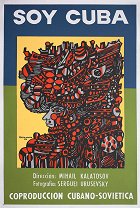Samenvattingen(1)
Tijdens de laatste dagen van het regime van Batista spelen zich op Cuba vier afzonderlijke verhalen af. In het eerste verhaal ontdekt de vriend van Maria dat zij eigenlijk een prostituee is, in het tweede verhaal krijgt een oude agrariër te horen dat zijn boerderij verkocht is aan een internationale organisatie, in het derde verhaal worden studenten die pamfletten voor Castro verspreiden neergeschoten door de politie, en in het laatste verhaal wordt een man door bombardementen gedwongen zijn huis te verlaten, waarna hij zich bij de guerilla's aansluit. (Columbia TriStar Films)
(meer)Recensie (1)
With a bit of exaggeration (but not that much), the viewer may feel, after almost two and a half hours, that they have only seen four cuts - between four separate stories. The countless intuitive and at the same time imaginative rides, Kalatozov's detailed false ceilings, and various camera angles are certainly still diligently studied by students at the Moscow Gerasimov Institute of Cinematography. Similarly, the story progresses smoothly from the seemingly invisible humiliation of a poor country, through the identification of the source of its misery in capitalism maintained by an imperialist colossus up north, and through the first isolated, uncoordinated attempts doomed to failure, to the conscious, organized mass victory of the revolution in the final story. Originally, even I, despite being an old leftist, wanted to be strict and criticize the film's overly readable plot. But when I hear (as in so many Eastern European films) the cries such as those who say, "it's all ideology," "victory of form over content," or "manipulation/abuse," I change my mind. An objective assessment would probably be that which saw Batista as the smiling guy who didn't do anything that the US ambassador saw with his own eyes (find out, for example, what the golden phone was), in 1961, the US sent a humanitarian mission full of freedom fighters to Cuba (probably like those in Syria today), and so on. There remains one unrelated question to ponder: how is it possible that Cuba is constantly elected to the United Nations Human Rights Council by the General Assembly of the UN? Strange, when we know that the whole world despises it because of Castro's totalitarian regime...
()
Galerie (39)
Foto © Mosfilm

